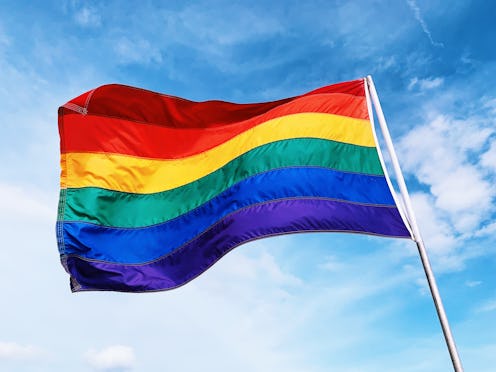Life
Don't Say This To Someone Who Just Came Out

Coming out can be a lot of different things for the person doing it: Exhilarating, nerve-wracking, painful, upsetting, wonderful, all of the above, none of the above — the possibilities are endless. What everyone who has gone through it or goes through it on a regular basis knows, though, is that there's nothing better than coming out to someone who makes you feel comfortable and safe at the end of it. Since I first came to terms with my sexuality five years ago, I've been coming out to people continuously — and every time I do it, I've realized that there are some things you should not say to someone coming out to you. Regardless as to what they're coming out about — their sexuality, their gender identity, or anything else — if you want to ensure that the person feels supported by the end of it, instead of awkward or unsettled, some things are best avoided.
Everyone has a different coming out story, and everyone will react a little differently to the person coming out to them. In my early days as a baby gay, the people who were the most helpful when I came out were the ones who didn't bombard me with questions; rather, they let me talk about these changes in my life and why they were important. As I've gotten more and more used to coming out and have gotten farther along in my life as a queer person, I'll save a little Q&A time at the end of my brief coming out spiel (which has truly gone from an entire talk to a simple, "Oh, yeah, I'm super gay"); however, this is a personal choice to do so — it's certainly not required. What I've found during these Q&A periods is that while some questions are totally fine, encouraging, or even humorous, others can be undermining and problematic. So, here are seven things to avoid asking when someone has just come out to you.
1. "I already knew/I've always known."
While it may be true that you've had a hunch about the person who came out to you for a while, it's really undermining to hear something like, "I've always known" in response to something that takes a great deal of courage to do. If a friend or family member does come out to you and you want to tell them you've always known, try something like, "I had a feeling that may be the case, but I'd love to hear more if you're open to talking about it." Making someone's coming out process about you is usually not the best idea; keeping to focus on them and their experience, however, is wonderfully supportive.
2. "You're so brave. Being in the closet must have been so hard for you."
Yep, being in the closet is usually not the best place to be — but it's important for allies to remember that sometimes it's necessary for LGBTQ people to stay in there in order to keep themselves safe (physically, mentally, or both), better understand themselves, or even come to terms with their own feelings. Though coming out of the closet is brave, many LGBTQ people wish it didn't have to be; furthermore, there's nothing cowardly about staying in there if that's what you need to do.
3. "What do your parents think?"
The topic of parental approval can be really, really hard for a lot of LGBTQ people, and while some parents are accepting of their LGBTQ child, many are not. When I came out to my friends as a 17 year old, I wanted to do everything I could to help them understand what it meant for me to be queer; however, I didn't want to talk about my parents or explain how I came out to different people. When a friend, classmate, or co-worker comes out to you, don't let their family history hijack the conversation unless the person coming out brings it up themself.
4. "Your parents must be sad they won't have grandchildren."
For some completely inexplicable reason, some people like to bring up how disappointed they think my parents must be. First of all, there are a variety of ways for LGBTQ people to have children (yes, even biological children, if that's your jam); and secondly, coming out is all about truths and real talk. There's no room for unwarranted assumptions — which is exactly what thinking LGBTQ people can't have or raise kids is.
5. "What a shame, all the boys/girls would have loved you."
I got this one a lot when I first came out. On the one hand, yes, who in their right mind wouldn't love me? I am fantastic. But on the other hand, it's not a shame. Straight, cisgender dudes are not anywhere on my radar in terms of finding love, so it doesn't matter whether they would have loved me or not.
6. "Who are you dating?"
Coming out doesn't automatically mean the person doing the coming out is dating someone. People who come out as trans, gender non-conforming, queer, lesbian, asexual, bisexual, gay, or anything else encompassed by the LGBTQA+ acronym may do it because they've found the love of their life or started dating someone, but they aren't necessarily doing it because of either of those reasons. Who someone is dating and whether they've come out are often unrelated, so just as you wouldn't pry into a straight or cis person's dating and sex life, don't do it to a queer person.
7. "How do you know you're gay/bi/trans/non-gender conforming/queer/etc.?"
How do you know you're straight and/or cis?
For more LGBTQ stories, check out Bustle on YouTube:
Images: Alexander Spatari/Moment/Getty Images; Giphy (6)